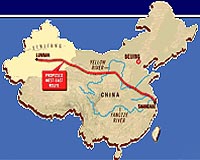 |
Accra, Ghana (UPI) Nov 24, 2010 Poverty-stricken Ghana is poised to become a serious oil producer but already it's grappling with the "resource curse" that has infected other Third World states that hit pay dirt. Western oil companies are planning to open promising new offshore zones in the Gulf of Guinea off Ghana's southern coast as the government wrestles with Exxon Mobil over a $4 billion bid to take over the Jubilee field, considered one of Africa's potentially most lucrative strikes in recent years. West Africa is an oil boom zone these days, all the way down the Atlantic coast from Sierra Leone on the shoulder of Africa down to Angola in the south. By 2025, one-fifth of U.S. oil imports will come from West Africa. Meantime, cash-laden Chinese oil companies are spending freely on snapping up concessions across the continent to fuel their country's economic boom. The China National Offshore Oil Corp. has its eyes on Jubilee, which contains the equivalent of at least 1.8 billion barrels of oil, with further discoveries likely. CNOOC, in partnership with state-owned Ghana National Petroleum Corp., which already owns a 13.75 percent stake in Jubilee, is reported to have put up a $5 billion bid for a 23.5 percent share of the field owned by the Texas wildcatter Kosmos Energy of Dallas. Kosmos, which discovered Jubilee in 2007, had planned to sell its stake to Exxon Mobil for $4 billion but it hadn't sought the approval of the Accra government of President John Evan Atta Mills, elected in January 2009. His government asserts the previous administration gave Kosmos the Jubilee contract on terms that were far too unfavorable to the state through the company's connections with businessmen close to President John Kufuor. Last December, the China Development Bank bolstered CNOOC's prospects by providing GNPC with $3 billion, which could help it buy out Kosmos and impose its own conditions. Indeed, the government, seeking to secure control of Jubilee itself and the $1 billion a year it is expected to provide once production starts, had been preparing its own bid through GNPC. The Kosmos-Exxon agreement appeared to "subordinate Ghanaian law governing a strategic national resource to a private contract made between two U.S. companies," a GNPC official explained. Exxon backed out of the proposed deal in August, but Kosmos, which operates elsewhere in Africa, says it plans to stick it out in Ghana and develop other assets. The Financial Times observed that this "acrimonious punch-up" has geo-strategic implications for the United States and China and a bearing on the future of Ghana's fledgling economy. "With local expectations of what oil could do the country's development and international interest high, Ghana's experience reveals how fraught it can be for African states to assert their interests as global competition for energy resources intensifies." In Uganda in East Africa, where major strikes have been made in and around Lake Albert, campaigners like Platform seeking to secure the equitable sharing of oil wealth for future generations, claim that production-sharing agreements are designed for company profit rather than national development, with Ugandan leaders taking their cut. "Our analysis reveals that the international oil companies are set to reap huge sums at Lake Albert -- as much as a 35 percent return on their capital investment," said Platform's Taimour Lay. "That's three times what's internationally recognized as a fair profit. "The oil contracts are structured so that (oil) price risk lies primarily with the state, while the private companies are virtually guaranteed a healthy return even if the market slumps." In Uganda, the prospect of significant wealth generation over the next few years is stirring domestic unrest and exacerbating regional and tribal rivalries. Unlike most African states in the post-colonial era, Ghana, once ruled by Britain, has been largely stable since a decade of coups and turmoil in the 1970s. "In theory," The Financial Times commented, "the country should be well-placed to avoid the pitfalls that have made other African oil economies dependent on volatile world prices and prey to corrupt elites. "In practice, the speed with which Ghana is moving from discovery to production is testing the country's institutional and regulatory capacity. "A confluence of venomous local politics and hard-headed commercial considerations have made for a bumpy ride."
Share This Article With Planet Earth
Related Links Powering The World in the 21st Century at Energy-Daily.com
 Russia, China to discuss gas pricing dispute
Russia, China to discuss gas pricing disputeMoscow (AFP) Nov 23, 2010 Russian Prime Minister Vladimir Putin and his Chinese counterpart Wen Jiabao will tackle pricing disputes in gas cooperation when they meet in Saint Petersburg on Tuesday. "A large package of intergovernmental, interministerial and commercial agreements is being prepared for signing," the Russian government said in a statement, adding the leaders would also discuss joint work in trade, scien ... read more |
|
| The content herein, unless otherwise known to be public domain, are Copyright 1995-2010 - SpaceDaily. AFP and UPI Wire Stories are copyright Agence France-Presse and United Press International. ESA Portal Reports are copyright European Space Agency. All NASA sourced material is public domain. Additional copyrights may apply in whole or part to other bona fide parties. Advertising does not imply endorsement,agreement or approval of any opinions, statements or information provided by SpaceDaily on any Web page published or hosted by SpaceDaily. Privacy Statement |